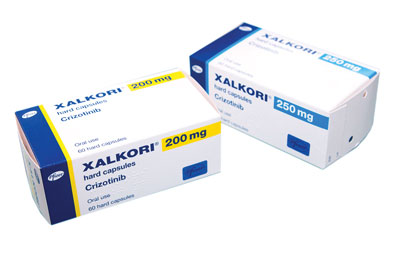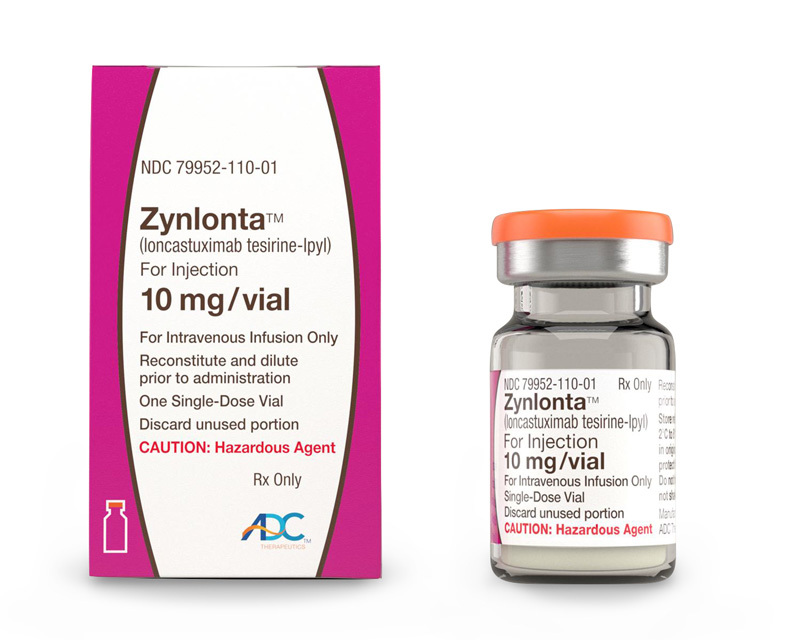Xalkori (crizotinib) vs Zynlonta (loncastuximab tesirine-lpyl)
Xalkori (crizotinib) vs Zynlonta (loncastuximab tesirine-lpyl)
Xalkori (crizotinib) is an oral small molecule tyrosine kinase inhibitor primarily used to treat non-small cell lung cancer (NSCLC) with specific genetic alterations, such as ALK or ROS1 rearrangements. In contrast, Zynlonta (loncastuximab tesirine-lpyl) is an antibody-drug conjugate used intravenously for the treatment of relapsed or refractory diffuse large B-cell lymphoma (DLBCL) after two or more lines of systemic therapy. The choice between Xalkori and Zynlonta would depend on the type of cancer a patient has, the specific genetic markers of their cancer cells, and their previous treatments, as these medications are not interchangeable and target different diseases.
Difference between Xalkori and Zynlonta
| Metric | Xalkori (crizotinib) | Zynlonta (loncastuximab tesirine-lpyl) |
|---|---|---|
| Generic name | Crizotinib | Loncastuximab tesirine-lpyl |
| Indications | Non-small cell lung cancer (NSCLC), ALK or ROS1 positive | Relapsed or refractory large B-cell lymphoma |
| Mechanism of action | ALK and ROS1 tyrosine kinase inhibitor | CD19-directed antibody and alkylating agent conjugate |
| Brand names | Xalkori | Zynlonta |
| Administrative route | Oral | Intravenous |
| Side effects | Visual disorders, GI disturbances, edema, elevated liver enzymes, etc. | Thrombocytopenia, neutropenia, anemia, fatigue, musculoskeletal pain, etc. |
| Contraindications | Hepatic impairment, concurrent use of strong CYP3A inhibitors/inducers | Hypersensitivity to loncastuximab tesirine-lpyl or its excipients |
| Drug class | Tyrosine kinase inhibitor | Antibody-drug conjugate |
| Manufacturer | Pfizer | ADC Therapeutics |
Efficacy
Xalkori (Crizotinib) and Its Efficacy in Lymphoma
Xalkori, known by its generic name crizotinib, is primarily known for its efficacy in treating non-small cell lung cancer (NSCLC) that is ALK or ROS1-positive. However, its efficacy in lymphoma, particularly anaplastic large cell lymphoma (ALCL), which is ALK-positive, has been a subject of research. ALK-positive ALCL is a subtype of non-Hodgkin lymphoma, and crizotinib has shown promise in preclinical studies and some clinical cases in targeting ALK-positive cells. While the use of crizotinib in lymphoma is considered off-label, the results from these studies have indicated potential benefits, particularly for patients who may not have responded well to traditional chemotherapy regimens.
Zynlonta (Loncastuximab Tesirine-lpyl) and Its Efficacy in Lymphoma
Zynlonta, or loncastuximab tesirine-lpyl, is a CD19-directed antibody and alkylating agent conjugate that has been approved for the treatment of certain types of lymphoma. Specifically, it is indicated for adult patients with relapsed or refractory diffuse large B-cell lymphoma (DLBCL) after two or more lines of systemic therapy. The efficacy of Zynlonta was evaluated in a multicenter, open-label, single-arm trial where patients demonstrated a significant response rate, with a notable percentage achieving complete remission. This has marked Zynlonta as an important treatment option for patients with DLBCL who have limited therapeutic options after the failure of multiple lines of systemic therapy.
Comparative Efficacy in Lymphoma
When comparing the efficacy of Xalkori and Zynlonta in the context of lymphoma, it is important to note that they target different subtypes and mechanisms of the disease. Xalkori's efficacy in lymphoma is more exploratory, particularly in ALK-positive ALCL, and is not a standard treatment, whereas Zynlonta has been specifically approved for use in relapsed or refractory DLBCL. The efficacy of Zynlonta in its indicated population is supported by clinical trial data and its approval by regulatory agencies for this specific use.
Conclusion
In conclusion, while Xalkori shows potential off-label use in ALK-positive ALCL, Zynlonta is an approved and effective treatment for relapsed or refractory DLBCL. The use of these drugs must be carefully considered by healthcare professionals based on the specific type of lymphoma, the patient's previous treatment history, and the current evidence supporting their use. Ongoing research and clinical trials continue to inform the medical community about the efficacy and safety of these drugs in various forms of lymphoma.
Regulatory Agency Approvals
Xalkori
-
European Medical Agency (EMA), European Union

-
Food and Drug Administration (FDA), USA

-
Health Canada

-
Pharmaceuticals and Medical Devices Agency (PMDA), Japan

-
Therapeutic Goods Administration (TGA), Australia

Zynlonta
-
European Medical Agency (EMA), European Union

-
Food and Drug Administration (FDA), USA

Access Xalkori or Zynlonta today
If Xalkori or Zynlonta are not approved or available in your country (e.g. due to supply issues), you can access them via Everyone.org.
How it works

Make an enquiry
Choose the medicine you want to buy, answer a couple of questions, and upload your prescription to speed things up. We’ll get back to you within 24 hours.


Make an enquiry
Choose the medicine you want to buy, answer a couple of questions, and upload your prescription to speed things up. We’ll get back to you within 24 hours.


Breeze through the paperwork
We'll guide you through the required documents for importing unapproved medicine, ensuring you have all the necessary information.


Get a personalized quote
We’ll prepare a quote for you, including medicine costs and any shipping, administrative, or import fees that may apply.


Receive your medicine
Accept the quote and we’ll handle the rest - sourcing and safely delivering your medicine.

Some text on this page has been automatically generated. Speak to your physician before you start a new treatment or medication.
Let's talk
If you have any questions, call us or send us a message through WhatsApp or email:
Contact us




